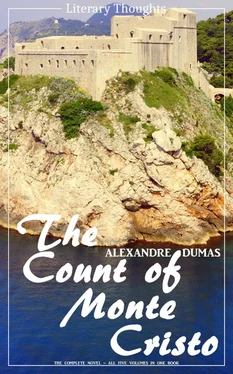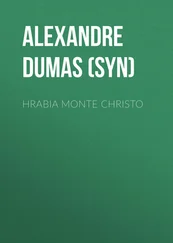Chapter 29 – The House of Morrel & Son.
Any one who had quitted Marseilles a few years previously, well acquainted with the interior of Morrel's warehouse, and had returned at this date, would have found a great change. Instead of that air of life, of comfort, and of happiness that permeates a flourishing and prosperous business establishment – instead of merry faces at the windows, busy clerks hurrying to and fro in the long corridors – instead of the court filled with bales of goods, re-echoing with the cries and the jokes of porters, one would have immediately perceived all aspect of sadness and gloom. Out of all the numerous clerks that used to fill the deserted corridor and the empty office, but two remained. One was a young man of three or four and twenty, who was in love with M. Morrel's daughter, and had remained with him in spite of the efforts of his friends to induce him to withdraw; the other was an old one-eyed cashier, called "Cocles," or "Cock-eye," a nickname given him by the young men who used to throng this vast now almost deserted bee-hive, and which had so completely replaced his real name that he would not, in all probability, have replied to any one who addressed him by it.
Cocles remained in M. Morrel's service, and a most singular change had taken place in his position; he had at the same time risen to the rank of cashier, and sunk to the rank of a servant. He was, however, the same Cocles, good, patient, devoted, but inflexible on the subject of arithmetic, the only point on which he would have stood firm against the world, even against M. Morrel; and strong in the multiplication-table, which he had at his fingers' ends, no matter what scheme or what trap was laid to catch him. In the midst of the disasters that befell the house, Cocles was the only one unmoved. But this did not arise from a want of affection; on the contrary, from a firm conviction. Like the rats that one by one forsake the doomed ship even before the vessel weighs anchor, so all the numerous clerks had by degrees deserted the office and the warehouse. Cocles had seen them go without thinking of inquiring the cause of their departure. Everything was as we have said, a question of arithmetic to Cocles, and during twenty years he had always seen all payments made with such exactitude, that it seemed as impossible to him that the house should stop payment, as it would to a miller that the river that had so long turned his mill should cease to flow.
Nothing had as yet occurred to shake Cocles' belief; the last month's payment had been made with the most scrupulous exactitude; Cocles had detected an overbalance of fourteen sous in his cash, and the same evening he had brought them to M. Morrel, who, with a melancholy smile, threw them into an almost empty drawer, saying: –
"Thanks, Cocles; you are the pearl of cashiers."
Cocles went away perfectly happy, for this eulogium of M. Morrel, himself the pearl of the honest men of Marseilles, flattered him more than a present of fifty crowns. But since the end of the month M. Morrel had passed many an anxious hour. In order to meet the payments then due; he had collected all his resources, and, fearing lest the report of his distress should get bruited abroad at Marseilles when he was known to be reduced to such an extremity, he went to the Beaucaire fair to sell his wife's and daughter's jewels and a portion of his plate. By this means the end of the month was passed, but his resources were now exhausted. Credit, owing to the reports afloat, was no longer to be had; and to meet the one hundred thousand francs due on the 10th of the present month, and the one hundred thousand francs due on the 15th of the next month to M. de Boville, M. Morrel had, in reality, no hope but the return of the Pharaon, of whose departure he had learnt from a vessel which had weighed anchor at the same time, and which had already arrived in harbor. But this vessel which, like the Pharaon, came from Calcutta, had been in for a fortnight, while no intelligence had been received of the Pharaon.
Such was the state of affairs when, the day after his interview with M. de Boville, the confidential clerk of the house of Thomson & French of Rome, presented himself at M. Morrel's. Emmanuel received him; this young man was alarmed by the appearance of every new face, for every new face might be that of a new creditor, come in anxiety to question the head of the house. The young man, wishing to spare his employer the pain of this interview, questioned the new-comer; but the stranger declared that he had nothing to say to M. Emmanuel, and that his business was with M. Morrel in person. Emmanuel sighed, and summoned Cocles. Cocles appeared, and the young man bade him conduct the stranger to M. Morrel's apartment. Cocles went first, and the stranger followed him. On the staircase they met a beautiful girl of sixteen or seventeen, who looked with anxiety at the stranger.
"M. Morrel is in his room, is he not, Mademoiselle Julie?" said the cashier.
"Yes; I think so, at least," said the young girl hesitatingly. "Go and see, Cocles, and if my father is there, announce this gentleman."
"It will be useless to announce me, mademoiselle," returned the Englishman. "M. Morrel does not know my name; this worthy gentleman has only to announce the confidential clerk of the house of Thomson & French of Rome, with whom your father does business."
The young girl turned pale and continued to descend, while the stranger and Cocles continued to mount the staircase. She entered the office where Emmanuel was, while Cocles, by the aid of a key he possessed, opened a door in the corner of a landing-place on the second staircase, conducted the stranger into an ante-chamber, opened a second door, which he closed behind him, and after having left the clerk of the house of Thomson & French alone, returned and signed to him that he could enter. The Englishman entered, and found Morrel seated at a table, turning over the formidable columns of his ledger, which contained the list of his liabilities. At the sight of the stranger, M. Morrel closed the ledger, arose, and offered a seat to the stranger; and when he had seen him seated, resumed his own chair. Fourteen years had changed the worthy merchant, who, in his thirty-sixth year at the opening of this history, was now in his fiftieth; his hair had turned white, time and sorrow had ploughed deep furrows on his brow, and his look, once so firm and penetrating, was now irresolute and wandering, as if he feared being forced to fix his attention on some particular thought or person. The Englishman looked at him with an air of curiosity, evidently mingled with interest. "Monsieur," said Morrel, whose uneasiness was increased by this examination, "you wish to speak to me?"
"Yes, monsieur; you are aware from whom I come?"
"The house of Thomson & French; at least, so my cashier tells me."
"He has told you rightly. The house of Thomson & French had 300,000 or 400,000 francs to pay this month in France; and, knowing your strict punctuality, have collected all the bills bearing your signature, and charged me as they became due to present them, and to employ the money otherwise." Morrel sighed deeply, and passed his hand over his forehead, which was covered with perspiration.
"So then, sir," said Morrel, "you hold bills of mine?"
"Yes, and for a considerable sum."
"What is the amount?" asked Morrel with a voice he strove to render firm.
"Here is," said the Englishman, taking a quantity of papers from his pocket, "an assignment of 200,000 francs to our house by M. de Boville, the inspector of prisons, to whom they are due. You acknowledge, of course, that you owe this sum to him?"
"Yes; he placed the money in my hands at four and a half per cent nearly five years ago."
"When are you to pay?"
"Half the 15th of this month, half the 15th of next."
Читать дальше












